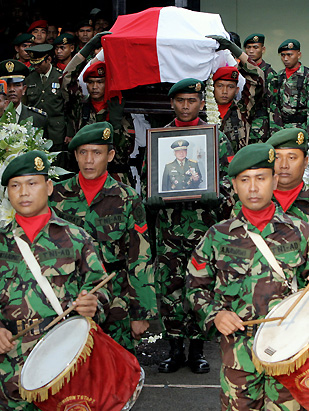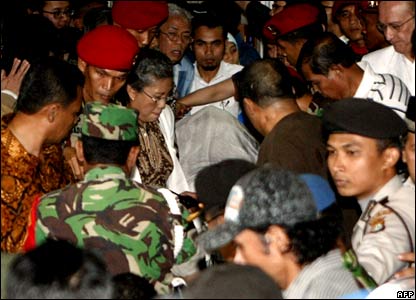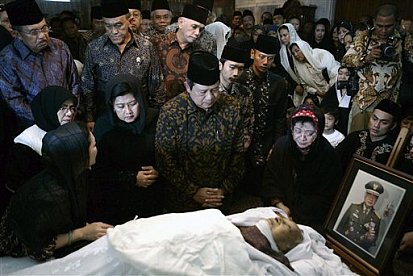Geoffrey Gunn
Laid to rest Monday, January 28, 2008 in a state funeral with full military honors at a family mausoleum outside Solo in central Java, former Indonesian strongman and president, Suharto, is truly buried. But, how has his legacy been appraised in the local, regional and global media? Indeed, what shadow has he cast over Indonesia beyond the grave, having died in bed surrounded by Indonesian and Asian dignitaries, not vilified in prison or exile, having evaded prosecution for embezzlement, not to mention human rights abuses?
One can pick and chose from Indonesian newspapers as diverse as the Jakarta Post, Suara Merdeka, Sinar Harapan and Kompas. Most are equivocal about his contributions to development versus his human rights record. Nevertheless, Kompas holds that Suharto “leaves a black historical record of his time” and the Jakarta Post went further to label him a “crook.”
Probably few inside Indonesia dared to oppose the state funeral. Even Kontras (Victims of Human Rights Violation), the organization founded by the murdered human rights lawyer Munir Said Thalib, fell in line on this point, even while urging that it was now time to “address the repressive legacy of Suharto’s administration. ” That would, of course, also require bringing to book Munir’s assassins aboard a Garuda flight in September 2005, believed to be high intelligence officials. (“Kematian Soeharto…”).
Already powerful voices among Indonesia’s military and civilian elite seek to vest the late ruler with “national hero” status. Among civil society groups, Indonesia’s Legal Aid Institute Foundation is one opposed to any such posthumous awards to the former dictator.
Foreign editorialists have been less kind, even if – certain among them – long applied self-censorship when writing of Suharto’s undeniable excesses.
True to its fawning record on Suharto’s Indonesian New Order government, as it was known, the Murdoch paper The Australian editorialized that “Suharto can be rightfully regarded as the man who rescued Indonesia from despair, turned back the tide of communism, and put his country on the uncertain road to democracy.” Greg Sheridan, also in The Australian (“Asian giant a boon for Australia,” 28 January 2008), writes that the Indonesian army “was not responsible for much of the killing” that followed the abortive coup of 1965, while playing down the extent of the killings.
The Australian (28 January 2008) also offered space to former Australian Ambassador to Jakarta at the time of the Indonesian invasion of East Timor. Richard Woolcott, well known for a leaked cable to the Canberra government, had urged “pragmatism over principle” in dealing with the Suharto regime. Woolcott waxes nostalgic over Suharto’s leadership qualities as much as his “polite and congenial” demeanor. Acknowledging “flaws,” Woollcott expects – or wishes -that future historians, especially in Australia, will judge him more “objectively” than it does at present.
Marilyn Burger, writing in the New York Times (January 28) allows that his rule was “not without accomplishment,” but economic successes were overshadowed by his “pervasive and large-scale corruption; repressive, militarized rule; and a convulsive mass bloodletting when he seized power.” The lengthy obituary points out that the army, which Suharto controlled, notably the Strategic Reserve Command, orchestrated the killings of between half and one million suspected communists including entire families along with long-term resident Chinese in the bloodletting of 1965-66. In addition, 750,000 were arrested in the crack down, with up to 100,000 held without trial over the following 14 years. Citing Cornell professor and Indonesia specialist Benedict Anderson, in the early 1980s, between 4,000 and 9,000 mostly criminals but including politicals became targets of army-backed death squads on Java. Some 200,000 perished as a consequence of Suharto’s American-backed invasion of the former Portuguese colony of East Timor. The New York Times correspondent does not mince words. Perhaps space precluded a full accounting of a litany of killings and disappearances of political opponents, human rights activists, trade unionists, ethnic secessionists, Muslim activists, and others over the decades.
In an unsigned piece, “Indonesia and the legacy of Suharto,” the Financial Times of London (28 January 2008) was far less explicit, but wonders whether the beneficiaries of Suharto-era corruption, namely the clique of soldiers and business people who still wield power today, have learnt anything since Suharto’s downfall. “It will be easier to end corruption if the crimes of the late Suharto, his relatives and associates are not swept under the carpet in a misguided attempt to burnish his legacy.”
Throughout the 32 years of Suharto’s New Order regime, Japan was Indonesia’s largest single creditor nation, investor, and trade partner. While, Japanese media reported Suharto’s death, no leading Japanese paper chose to editorialize on his passing. An exception was the English language Japan Times whose editorial, “Remembering Mr. Suharto” (31 January 2008), reminded local readers that “Japan was a staunch supporter of his [Suharto’s] regime and has been the biggest giver to Indonesia of official government assistance and other financial aid.” Describing his legacy as “negative, the Japan Times calls for an examination of “what Mr. Suharto and people close to him did.”
Not surprisingly, press in the ASEAN countries tends to view Suharto’s New Order in big picture security terms as opposed to the war he waged against Indonesian citizens. The Bangkok Nation (30 June 2008), for example, while conceding that Suharto was a “paradox,” editorialized that “For the countries of Southeast Asia, Suharto was seen as bringing stability and peace.” Certainly that is not a view shared inside occupied East Timor. What precisely were Suharto’s contributions to regional peace, one wonders.
The Star (January 30), of Malaysia, blandly reported the words of former Premier Mahathir that he was indebted to Suharto for ending the low intensity “war of confrontation” waged by his predecessor, the flamboyant anti-Western Sukarno, against the British-created Federation of Malaysia.
As reported in Singapore’s channelnewsasia.com, (30 January 2008), Singapore “Minister Mentor” Lee Kuan Yew wrote in his condolence letter, “I have no doubt that history will accord Pak Suharto a place of honor in Indonesia’s history when his life’s work is studied in calm perspective.”
Academic comment has been divided. Australia is one country where Indonesia is literally on the radar screen. Jamie Mackie, doyen of Australian Indonesianists (and this writers’ professor of Indonesian studies at Melbourne university in 1967) writing in The Australian (January 28), praises Suharto’s economic accomplishments, yet also notes that he accepted without remorse the doctrine that the end justifies the means. Overall, the judgment of history will be hard, he summarizes, just as judgments over time are bound to fluctuate. Whether or not his reputation stands up, he adds, is also contingent upon the overall performance of his successors including, from 2004, Susilo Bambang Yudhoyono.
Damien Kingsbury of Australia’s Deakin University, argues that now “Suharto is gone, as is his lingering influence” (The Age, January 29). Well, one would like to think so, yet surely the military that he nurtured has not relinquished its various powers. Tao Duanfang writing in China’s Zhongguo Wang news portal (28 January) states the reverse, namely that legacies of the Suharto era “will not automatically be resolved with the disappearance of the Suharto era or Suharto himself.” (See “Asian Press Bid Suharto Farewell.”) He did not elaborate, but obviously that would include closure on a series of human rights cases, from Aceh, to East Timor, to Papua and on Java, not to mention the economic crimes committed by the Suharto family.
Pulling no punches, Jeffrey Winters of Northwestern University writes in Topica, the email discussion list, that, “the horror of 1965 remains blurred by a fear even today of being labeled a communist.” Comparing Suharto to the Philippine dictator Ferdinand Marcos, who died in disgrace and exile, Winters refutes the argument that sacrifice of human rights was the necessary price that had to be paid for economic development, Winters declares, “The damage of the Suharto regime will far outlast the temporary benefits it produced,” (29 January 2008), in part a reference to the profligate exploitation of Indonesia’s finite sources of hydrocarbons, along with tropical forestry resources.
International human right groups, certain of which have tracked the New Order regime for decades, did raise their voices. Carmel Budiardjo, of UK-based Tapol, the Indonesian Human Rights Campaign, and herself a political prisoner for three years under Suharto until released under official British pressure, writes that, unlike a slew of other dictators from Pinochet to Pol Pot, “Sukarno could count on his blessings that, apart from the Netherlands where Indonesia was a familiar topic, he could, and did, get away with blue murder without much of the world even noticing.” (http://tapol.gn.apc.org).
As condolences have been forthcoming for the late dictator from Washington to Canberra, to Singapore, to Tokyo—all of whom richly supported him during his reign—but even extending to East Timor, among world leaders, New Zealand Prime Minister Helen Clark, apparently, has stood apart declaring that, owing to the late dictator’s “appalling” human rights record, she would not sign a condolence book.
By contrast, U.S. Ambassador to Indonesia, Cameron R. Hume, praised Suharto for achieving “remarkable economic and social development.” In words that would have pleased a succession of US administrations, he also praised the former Indonesian president for retaining close ties to the United States while playing an important part in the Non Aligned Movement and in the founding of the Association of Southeast Asian Nations. Allowing that there may be “some controversy” over his legacy, the Ambassador appraised Suharto as an “historic figure.” (Press Release, January 27, 2008)
But this was obviously a minimalist statement from the nation which levered the General to power and backed him with over one billion dollars in armaments, including the military equipment used in the invasion of East Timor. Pointedly, the respected French journal, Le Monde Diplomatique (29 January 2008), offers that the Ambassador’s words can only be construed as “humour noir,” if we factor in the 500,000 deaths of 1965 and the 200,000 dead in East Timor. “Mais pour Washington, il fut un allie fidele ‘a bastard, but one of our bastards,’ selon le dicton en vogue a la CIA”. [But for Washington, he was a loyal ally, “a bastard, but one of our bastards,’ in the CIA saying of the time].
As the Japanese Ministry of Foreign Affairs (Press Conference, 29 January 2008) deputy press secretary reflectively – or rather, enigmatically – observed of Suharto’s passing, “A lot of us remain solemn witnessing the end of an era in Asian history” (Tanaguchi Tomohiko, Press conference, 29 January 2008). An odious era, indeed, but is it truly the end? Or did the Indonesian ruler succeed in passing the baton to a successor generation that will honor his legacy not only in words, but perhaps, more ominously, in deeds.
Obviously, without accountability, Indonesia’s new democracy stands on very shallow sands. As with the case of East Timor, where the United Nations held back from promoting an International Tribunal to judge the perpetrators of the crimes against humanity to allow Indonesia to rebuild its own justice system, it was thought and expected of the Jakarta government that it would act to bring an end to a culture of impunity. Sadly, the fact that Suharto, his family, and cronies (Suharto Inc), have so far have evaded prosecution reveals that the Indonesian elite in power today has failed both its people and its international well-wishers of which there are many.
See Andre Vltchek, The Suharto Legacy – As He Lay Dying. Japan Focus.
Geoffrey Gunn first visited Indonesia in 1967 as a student of Indonesian language. He is author (with Jefferson Lee) of A Critical View of Western Scholarship and Journalism on East Timor (Journal of Contemporary Asia Press, Manila, 1994) and a Japan Focus associate.
He wrote this article for Japan Focus. Posted January 31, 2008.






